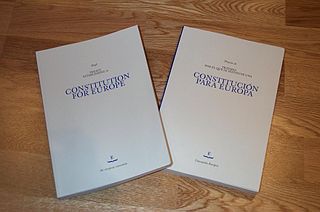Related Research Articles

Environmental laws are laws that protect the environment. Environmental law is the collection of laws, regulations, agreements and common law that governs how humans interact with their environment. This includes environmental regulations; laws governing management of natural resources, such as forests, minerals, or fisheries; and related topics such as environmental impact assessments. Environmental law is seen as the body of laws concerned with the protection of living things from the harm that human activity may immediately or eventually cause to them or their species, either directly or to the media and the habits on which they depend.

A free trade area is the region encompassing a trade bloc whose member countries have signed a free trade agreement (FTA). Such agreements involve cooperation between at least two countries to reduce trade barriers, import quotas and tariffs, and to increase trade of goods and services with each other. If natural persons are also free to move between the countries, in addition to a free trade agreement, it would also be considered an open border. It can be considered the second stage of economic integration.
Jurisdiction is the legal term for the legal authority granted to a legal entity to enact justice. In federations like the United States, the concept of jurisdiction applies at multiple levels.

The United Nations Convention on the Law of the Sea (UNCLOS), also called the Law of the Sea Convention or the Law of the Sea Treaty, is an international treaty that establishes a legal framework for all marine and maritime activities. As of July 2024, 169 States and the European Union are parties.

De minimis is a Latin expression meaning "pertaining to minimal things" or "with trifles", normally in the terms de minimis non curat praetor or de minimis non curat lex, a legal doctrine by which a court refuses to consider trifling matters. Queen Christina of Sweden (r. 1633–1654) favoured the similar Latin adage, aquila non capitmuscās.

The Treaty establishing a Constitution for Europe was an unratified international treaty intended to create a consolidated constitution for the European Union (EU). It would have replaced the existing European Union treaties with a single text, given legal force to the Charter of Fundamental Rights, and expanded qualified majority voting into policy areas which had previously been decided by unanimity among member states.

The Peace of Augsburg, also called the Augsburg Settlement, was a treaty between Charles V, Holy Roman Emperor, and the Schmalkaldic League, signed on 25 September 1555 in the German city of Augsburg. It officially ended the religious struggle between the two groups and made the legal division of Christianity permanent within the Holy Roman Empire, allowing rulers to choose either Lutheranism or Roman Catholicism as the official confession of their state. Calvinism was not allowed until the Peace of Westphalia.
In international economic relations and international politics, most favoured nation (MFN) is a status or level of treatment accorded by one state to another in international trade. The term means the country which is the recipient of this treatment must nominally receive equal trade advantages as the "most favoured nation" by the country granting such treatment. In effect, a country that has been accorded MFN status may not be treated less advantageously than any other country with MFN status by the promising country.

The ten cantons of the Federation of Bosnia and Herzegovina, one of the two political entities of Bosnia and Herzegovina, are its federal units with a high level of autonomy. The cantons were established by the Law on Federal Units (Cantons) on 12 June 1996 as a result of the Washington Agreement of 1994 between the representatives of the Bosnian Croats and Bosniaks.
In semantics, mathematical logic and related disciplines, the principle of compositionality is the principle that the meaning of a complex expression is determined by the meanings of its constituent expressions and the rules used to combine them. The principle is also called Frege's principle, because Gottlob Frege is widely credited for the first modern formulation of it. However, the principle has never been explicitly stated by Frege, and arguably it was already assumed by George Boole decades before Frege's work.

The Cotonou Agreement is a treaty between the European Union and the African, Caribbean and Pacific Group of States. It was signed in June 2000 in Cotonou, Benin's largest city, by 78 ACP countries and the then fifteen Member States of the European Union. It entered into force in 2003 and was subsequently revised in 2005 and 2010.
Legality, in respect of an act, agreement, or contract is the state of being consistent with the law or of being lawful or unlawful in a given jurisdiction, and the construct of power.

The International Telecommunications Satellite Organization (ITSO) is an intergovernmental organization charged with overseeing the public service obligations of Intelsat, which was privatized in 2001.
A free trade agreement (FTA) or treaty is an agreement according to international law to form a free-trade area between the cooperating states. There are two types of trade agreements: bilateral and multilateral. Bilateral trade agreements occur when two countries agree to loosen trade restrictions between the two of them, generally to expand business opportunities. Multilateral trade agreements are agreements among three or more countries, and are the most difficult to negotiate and agree.
The arm's length principle (ALP) is the condition or the fact that the parties of a transaction are independent and on an equal footing. Such a transaction is known as an "arm's-length transaction". It is used specifically in contract law to arrange an agreement that will stand up to legal scrutiny, even though the parties may have shared interests or are too closely related to be seen as completely independent.
The Arbitration Commission of the Conference on Yugoslavia was an arbitration body set up by the Council of Ministers of the European Economic Community (EEC) on 27 August 1991 to provide the conference on Yugoslavia with legal advice. Robert Badinter was appointed to President of the five-member Commission consisting of presidents of Constitutional Courts in the EEC. The Arbitration Commission has handed down fifteen opinions on "major legal questions" raised by the conflict between several republics of the Socialist Federal Republic of Yugoslavia (SFRY).

The Tla'amin First Nation, formerly Sliammon Indian Band or Sliammon First Nation, is a First Nations self governing nation whose lands and traditional territories are located on the upper Sunshine Coast in southwestern British Columbia, Canada. The Tla'amin are closely related to the Klahoose and Homalco peoples and have shared their adjoining territories; formerly all three as well as K'omoks were grouped collectively as the Mainland Comox due to their shared language. They have been part of the Coast Salish indigenous peoples of the western coast of Canada since ancient times.

Island House was a locally listed building in Birmingham's Eastside area, with a roughly triangular footprint. It was built in 1912 by the architect G. E. Pepper, in the Edwardian Mannerist style, ornately decorated with both Ionic and Doric decorations. Originally it was designed to be used as office building and warehouse for the prominent “Messrs Churchill & Co” machine tool company. The opening ceremony of Island House was held in 1913.

Relations between Serbia and Brazil have been very strong and well built since 1946 when relations were established between the Socialist Federal Republic of Yugoslavia and Brazil. Brazil does not recognize Kosovo as an independent state and has announced it has no plans to do so without an agreement with Serbia.

Ngāti Tamaoho is a Māori iwi (tribe) of Auckland and the Waikato District of New Zealand. It is part of the Waiohua confederation of tribes. They have three marae, which are at Karaka, Mangatangi and Pukekohe. The tribe is a strong supporter of the Māori King Movement.
References
- ↑ Schatzki, Michael. "Agreement in Principle". Negotiation Dynamics. Archived from the original on 2012-05-04. Retrieved 2012-03-13.